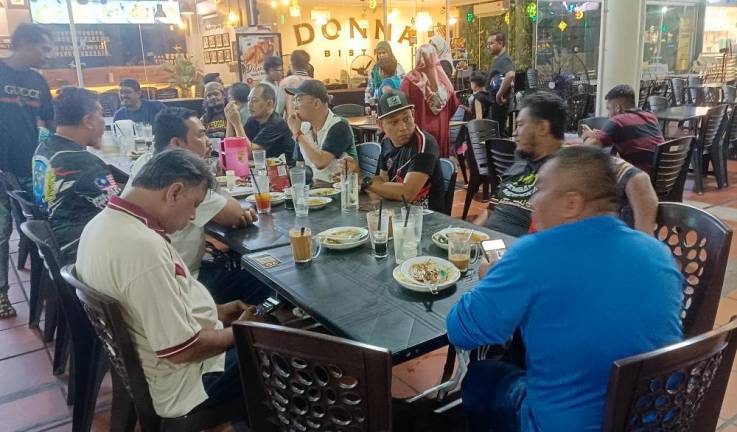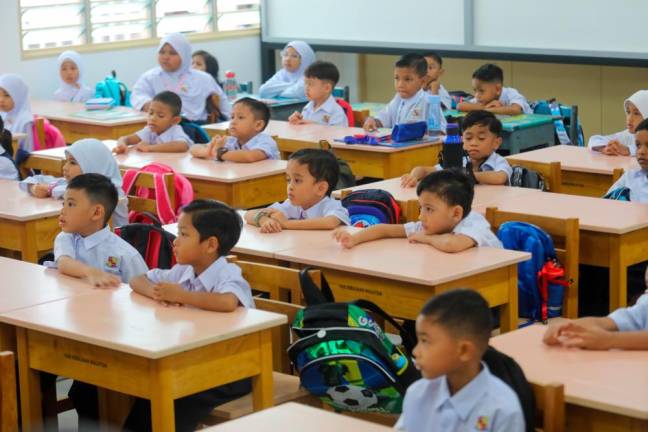KUALA LUMPUR: The odour was nauseating. Rats and cockroaches could be seen scampering in all directions. Folded cardboard boxes were stacked up against the wall while clothes hung from makeshift clothes lines.
This was the scene that “greeted” enforcement officers from the Department of Labour Peninsular Malaysia (JTKSM) when they raided a hostel – located on two floors of a three-storey shophouse where 40 foreigners employed by a retailer stayed in Bandar Tun Razak, Cheras, here – during a recent operation on forced labour and human trafficking.
Aside from their deplorable living conditions, the workers were forced to share their space with the retailer’s stocks and slept on folded cardboard boxes. Ventilation was poor and leaky pipes had resulted in the formation of water puddles on the floor.
A representative of the employer, when interviewed by Bernama during the operation, claimed that the company has fulfilled their responsibility of providing accommodation but has “no time to monitor the living conditions and amenities”, adding that they have left it to the workers to resolve any issue they face.
Following the five-hour operation, the employer was found to have breached various provisions under the Employees’ Minimum Standards of Housing, Accommodation and Amenities Act 1990 (Act 446) and Employment Act 1955.
NEGLECT WORKERS’ WELFARE
Similar operations carried out by the authorities in the past have also uncovered various offences committed by employers nationwide.
According to JTKSM, a total of 1,285 investigation papers were opened between February 2021 and March this year for offences committed under Act 446.
Of these cases, 135 have already been prosecuted and fined a total of RM1 million. Another 908 cases were issued compounds totalling RM10.5 million while the rest are awaiting action from the Deputy Public Prosecutor’s Office.
Despite the operations and legal action taken against them, many employers continue to neglect the welfare of their workers, particularly in terms of their safety and health.
JTKSM deputy director-general (Operations) Mohd Asri Abd Wahab said his department, in its efforts to combat the issue of forced labour and improve the nation’s labour management, found the situation “very worrying”.
“Each time we conduct an operation, we find that failure to comply with Act 446 is among the principal offences committed by employers, most of whom have a large workforce and fail to provide conducive accommodation,” he told Bernama.
It was reported that as of December last year, 50 percent of 37,662 employers in Malaysia had yet to obtain the Certificate of Accommodation from JTKSM, as required under the amendments to Act 446 that were enforced on June 1, 2020.
IMPROVE ACT 446
Under Section 24D of Act 446, an employer or centralised accommodation provider can be prosecuted for failing to obtain a Certificate of Accommodation from JTKSM.
According to Mohd Asri, the certificate will only be issued by JTKSM if the employer or centralised accommodation provider provides accommodation that meets the minimum standards specified by Act 446, which include the provision of utilities and amenities such as bathroom, toilet, bed and mattress as well as space for cooking, resting and eating.
“An employer who fails to do so can be fined up to RM50,000 while the centralised accommodation provider faces a fine of up to RM50,000 and a prison term of up to a year or both,” he explained.
Mohd Asri also said that his department is now in the midst of amending Act 446 to further improve the Act and incorporate provisions enshrined in the recently expired Emergency Ordinance 2021.
He said the amendment will provide powers to the (JTKSM) Director-General to order employers to replace, renovate or repair accommodation or housing regarded as unfit and unsafe for workers.
ELEVEN INDICATORS
Mohd Asri said the government is serious in its efforts to improve the welfare of its foreign workers as per Malaysia’s move to ratify the International Labour Organisation (ILO) Protocol 29 in Geneva, Switzerland, recently on March 21.
Protocol 29 is an additional protocol to the Forced Labour Convention that was ratified by Malaya in 1957. Malaysia is the 58th country in the world to ratify Protocol 29, thus signifying the government’s commitment to combat forced labour in all forms including human trafficking.
The ILO has outlined 11 indicators of forced labour which include retention of identity documents like passports and personal documents without the permission of the workers and isolating the workers so that they cannot be contacted or traced.
“There are also employers who abuse workers based on their vulnerabilities and who don’t have much education and are poor and have no place to go to.
“Many employers also don’t care how long their workers have been working or the type of work they do as long as they are given food and shelter, causing them (employers) to take advantage of their workers by not paying them for work done,” he added.
MONITORING
Meanwhile, Universiti Kebangsaan Malaysia Faculty of Social Science and Humanities lecturer Mohd Shazwan Mokhtar said Act 446 needs to be supported by other mechanisms to enable employers to provide accommodation and basic needs to their workforce.
He also called for regular operations or monitoring by the authorities who, he added, should require employers to submit to them reports on their employees’ well-being.
Mohd Shazwan also opined that the complaints platform should be improved to make it easier to channel information to the authorities, especially JTKSM.
He said the use of digital platforms such as a complaints application or setting up one-stop centres or kiosks in industrial areas will allow workers to lodge a report if they are abused by their employers.
“If we were to observe, the problem of forced labour usually occurs in the ‘dirty, difficult and dangerous’ (3D) job sector. It’s really unfortunate for the abused foreign workers if they have no proper place or channel to complain to.
“In terms of enforcement, the government must consider recommendations to enhance their enforcement capacity,” he said.
It has been reported previously that Malaysia only has about 400 labour inspectors nationwide, with the number insufficient to monitor all companies and inspect their premises for forced labour and other forms of abuse.
Translated by Rema Nambiar
-- Bernama









